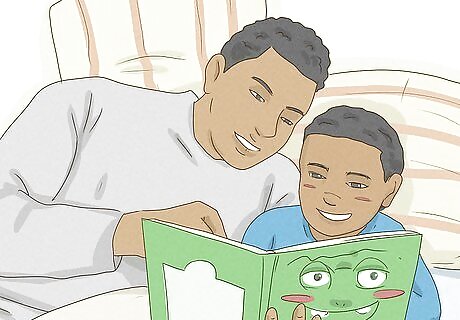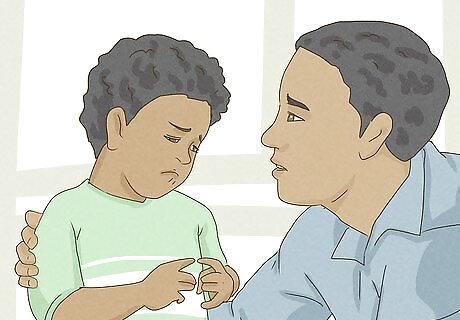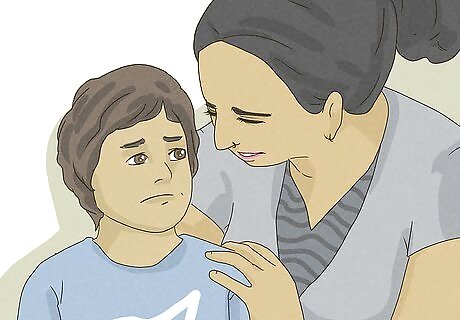
views
New Sibling

Reassure them that they’re loved. Ultimately, jealousy comes from a place of insecurity and fear. Your job is to remind your little one that you will always love and care for them, even if your family is growing. Remind on many occasions that they’re loved, and that they’re also a very important part of the family. You can say something like, “We will always love you so very much, no matter how much our family grows.”

Remind them that they won’t always be the center of attention. Take your child aside and let them know that, sometimes, their sibling will receive a little more attention from other family members. This doesn’t mean that your child isn’t loved or cared for. To make this conversation a little easier, remind your child of times when they had a lot of attention. For example, you can remind your child of the time some family members stopped by their soccer game, or their piano recital.

Focus on the baby if your child acts aggressive. Jealousy can be very physical, especially with younger kids. You might notice your young one throwing their toys, or pinching or hitting their siblings. Don’t yell at your jealous child or give them any kind of attention—that’s why they’re misbehaving in the first place. Instead, focus on the baby, and make sure they’re safe and okay. This will show your jealous child that acting mean or hurtful won’t get them any attention. If your older child is jealous and they're acting out in a way that's disrespectful, just ignore it if they're preschool age or younger. If they're a little older, don't react, but do include a consequence for the behavior.

Give your child something to do so they don’t feel left out. Find easy ways that your little one can help out with their new sibling. Choose any kind of task, no matter how simple—they might hand you the baby bottle, or grab you a clean diaper. This will help them feel important, and may reduce some of their jealous feelings. For instance, if the baby is getting upset during a car ride, you can ask your child to sing them a soothing song.

Maintain your child’s usual routine. A new baby will definitely throw a wrench in your usual schedule, but try to keep your child’s routine as normal as possible. Your little one is more likely to feel jealous and upset when they feel a big shift in their own schedule. For instance, continue reading your child a story before tucking them in, or make them the same food for breakfast each morning.

Ask for extra help so you can spend more time with your other child. There’s nothing wrong with asking a trusted friend or relative to look after your new baby for a little while. Use this extra time to bond with your child, so they don’t feel left out or forgotten.

Don’t compare your children. Avoid making blanket statements, like “Why can’t you be quiet like your sister” or “I wish you could behave like your brother.” These types of statement will only make your child feel more jealous and unhappy, and won’t actually achieve anything productive. Instead, you might say something like, “I know you have a lot of energy, but would you mind playing with your toys downstairs while I finish changing your brother’s diaper?”
Preschool and School-Aged Children

Remind your children that they can’t be the center of attention constantly. Really young kids might try to battle for your attention when you’re in the middle of something else. Calmly remind your little one that you can’t play with them at this moment, and encourage them to do something else, like draw a picture or play with their favorite toy. Say something like, “I’m going to talk to Mr. Brown for a few more minutes. Can you play with your toys until I’m done?” You might also say, “I’m going to help Caitlin with her homework right now. Do you want to watch TV until I’m done?”

Validate their jealous emotions. Tell your child that you understand their feelings, and that you understand why they feel jealous. Your child might tone down their complaints and behavior if they feel like you really hear and understand their struggles. For example, you can say something like, “You’re sad that Robin got a special solo and you didn’t.” You might also say, “I know that it’s hard for you to wait while I give little Jimmy a bath.”

Thank your child for being honest about their feelings. Remind your child that honesty is important, and that it’s great for them to be upfront about their feelings. Thank and praise them whenever they share how they’re feeling. This will encourage them to be honest in the future, and will help you nip any negative feelings in the bud. For example, you can say, “Thank you so much for letting me know how you’re feeling” or “I really appreciate you being honest with me.”

Label the jealousy with a silly nickname. Pick a really goofy name, so your kids remember that their jealousy is just a feeling, and not part of their identity. This will help your young ones view their jealousy as a separate “person,” which will make the feeling easier to dismiss and ignore. You might say something like, “It looks like Jake the Jealousy is knocking at the door. You don’t have to let him in the house!”

Praise your child’s strengths. Many times, kids tend to compare themselves to their siblings, friends, and acquaintances, which leads to a lot of bitterness and jealousy. Remind your young one that they have plenty of wonderful traits and qualities that make them special, and that they don’t need to compare themselves to anyone else. You can say something like, “You’re so good at art” or “You’re a star basketball player!” This can help your child focus on their own strengths and gifts. You might also say something like, “You’re such a kind, sweet, and genuine person.”

Teach your children to share their feelings honestly with others. It’s perfectly normal if your child is feeling jealous of another classmate or friend. Encourage them to share these feelings in a polite way, so the jealousy doesn’t fester or get worse. Guide them through a few possible conversations they can have, so they’ll be prepared in the actual situation. They can say something like, “You’re a really good friend. This is a little embarrassing to admit, but I feel a little jealous at how much better you are at math than I am. I don’t want these feelings to hurt our friendship, so I wanted to let you know.” They might also say, “You mean a lot to me, and I want to be honest about how I’ve been feeling. You always wear such cool outfits, and it makes me feel a little jealous.”

Encourage your kids to praise and compliment others. Jealousy often stems from personal insecurity, like someone being really talented at sports or coming to school in a cool outfit. Teach your kids to fight these negative feelings, and replace them with something positive instead. Whenever your child is feeling jealous, encourage them to share a compliment instead. For example, your child can say something like, “You did a really amazing job on that science project” or “I’m really impressed at how fast you ran in gym class.” They might also say, “Your outfit looks really amazing” or “I love the way you did your hair.” Empathy can help your child be less jealous. Try modeling helpful, generous actions—then, encourage your children to do the same.
Teenagers

Encourage older kids to unplug from social media. Social media users tend to post their best and brightest moments online, which can make others feel inadequate. Plus, all those photo filters can lead to unrealistic and unhealthy expectations when it comes to appearance. Remind your teen that appearances can be deceiving, and they shouldn’t compare themselves to other people online. If needed, set some social media limits for your kids, or encourage them to log out or take breaks. For instance, you might set a 1- or 2-hour limit for scrolling through social media, so your kid can unplug for a little while.

Support their interests and hobbies. Give your child a lot of confidence and self-esteem in their own abilities and talents. Compliment them whenever they’re working towards their goals, and help them sign up for special classes. If your child feels supported, they might not feel as jealous of their peers. For instance, you might sign your teen up for ballet class, or pay for them to have voice lessons.

Set a good example for your kids at home. You might be experiencing some jealousy in your own life, which is perfectly normal and okay. Instead of unloading those negative feelings on your kids, demonstrate some healthy, respectful ways to deal with jealousy. Show your children that it’s normal and okay to feel jealous, but that those feelings don’t have to define or control your life. For instance, you might say, “I feel like the new employee they hired is a lot better with computers than I am. Still, I know that we both offer valuable skills to the workplace.” You could say “Our neighbor always goes all-out with the Christmas decorations” instead of saying “Our home never looks as good as our neighbor’s.”

Remind them that rejection is normal and okay. If your teen gets out of a tough relationship, they might be feeling bitter and jealous, especially if their ex starts seeing another person. Let them know that rejection is just a part of life, and not every relationship will work out. They’re still young, and have plenty of time to scope out and plan their future! You might say, “I know it’s hard to watch Dave walking around with his new girlfriend. These feelings are only temporary.” You could also say, “It’s really hard to see Jessica start a new relationship, but there are plenty of bigger and better things on the horizon for you.”

Avoid teasing your kids about their feelings. Don’t try to dismiss or laugh away your teen’s struggles—while humor is an understandable default when conversations get tough, it won’t help if your child is trying to cope with their jealous feelings. Instead of poking fun at their emotions, lend a supportive and understanding ear to whatever they’re dealing with. Instead of making a joke, such as “Looks like someone’s jealous,” you can say something like, “I’m sorry you’re feeling this way. Would you like to talk about it?”




















Comments
0 comment